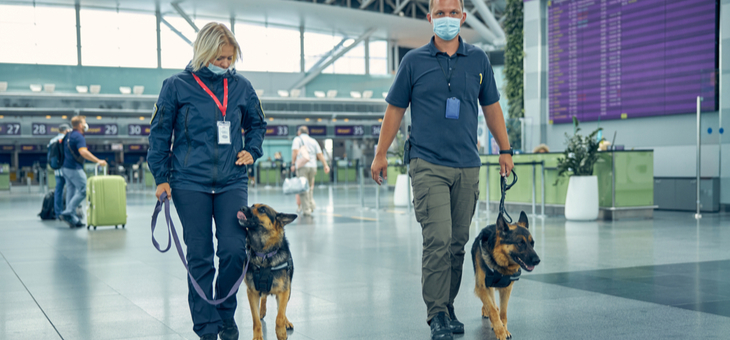As if our wonderful canine partners needed to do any more. They already provide unconditional love and unsurpassed companionship, improve our physical and mental health, help strengthen our immune systems and improve empathy, self-esteem and social skills.
Now, they can help us in the fight against COVID-19.
Specially trained detection dogs can sniff out COVID-19-positive samples with 96 per cent accuracy, says a proof-of-concept investigation published in the journal PLOS ONE.
“This is not a simple thing we’re asking the dogs to do,” says Cynthia Otto, senior author on the work and director of the University of Pennsylvania School of Veterinary Medicine Working Dog Center.
“Dogs have to be specific about detecting the odour of the infection, but they also have to generalise across the background odours of different people: men and women, adults and children, people of different ethnicities and geographies.”
The “dog test” is likely a long way off from being applied because the dogs in the test could “only distinguish between positive and negative results in samples that they had trained with; they failed to detect SARS-CoV-2 when presented with completely new samples,” reports livescience.com.
There was also an issue with a sample from a patient who had tested negative for COVID but was previously infected, reports fiercebiotech.com.
But for future studies, researchers now know to train dogs on diverse samples and not repeatedly test the dogs on samples from the same individuals.
And Dr Otto and her colleagues are already expanding their investigations into a study in which dogs are being trained to discriminate between the odours of COVID positive, negative and vaccinated individuals based on the organic compounds they leave on a T-shirt worn overnight.
“We are collecting many more samples in that study – hundreds or more – than we did in this first one and are hopeful that will get the dogs closer to what they might encounter in a community setting,” Dr Otto says.
The Working Dog Center had previously trained dogs to detect other conditions, including ovarian cancer.
Read more: Eight things we do that confuse our dogs
Two highly trained dogs were used at a NASCAR event in March to screen 1000 crew members, officials, and essential racing personnel at Atlanta Motor Speedway to determine whether they had the virus prior to entering the track’s garage area.
NASCAR managing director of racing operations Tom Bryant told The Charlotte Observer dogs were used because they worked fast.
“When you combine the speed of the dog with the accuracy level that they’re seeing from the dogs, we’ve not found a test yet that gives you that high a degree of confidence that it’s correct in that short amount of time.”
The detection dogs were taking just 20 seconds to sniff an individual and detect COVID-19. Dogs were used instead of rapid testing because of concerns over missing a ‘false negative’ rather than a ‘false positive’
The NASCAR contractor, 360 K9 Group, claims their dogs can detect the COVID-19 virus on someone with an accuracy rate of 98 per cent, often early in the infection cycle, before other tests register a positive infection.
Read more: Special abilities of dogs
Coronavirus-sniffing dogs have been used to screen guests entering the arena for Miami Heat NBA professional basketball games this season.
In September 2020, The Guardian reported that four COVID-19 sniffer dogs had begun a trial overseen by the University of Helsinki at Helsinki Airport, detecting the presence of the coronavirus within 10 seconds.
“After collecting their luggage, arriving international passengers were asked to dab their skin with a wipe. In a separate booth, the beaker containing the wipe is then placed next to others containing different control scents – and the dog starts sniffing.”
A similar trial was undertaken at Dubai International Airport.
Do you know any other unique jobs dogs undertake? Have you dealt with sniffer dogs when travelling?
Read more: Why do dogs eat grass?
If you enjoy our content, don’t keep it to yourself. Share our free eNews with your friends and encourage them to sign up.

